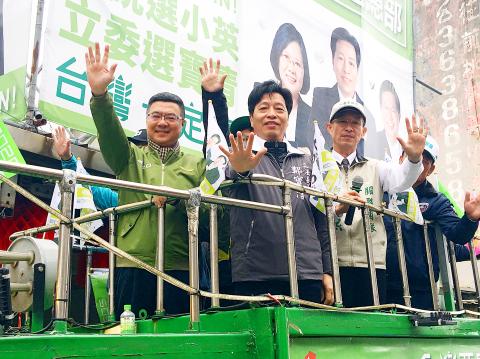Former premier Yu Shyi-kun (游錫堃), along with other Democratic Progressive Party (DPP) and pan-green camp leaders, yesterday condemned remarks by former president Ma Ying-jeou (馬英九) and others from the Chinese Nationalist Party (KMT) that compared passage of the Anti-infiltration Act (反滲透法) with the Martial Law era and claimed the nation had fallen victim to “green terror.”
Ma yesterday said: “Passing the Anti-infiltration Act is like restoring martial law in Taiwan. It was the darkest day and the most shameful day in the history of Republic of China Constitution.”
Yu lashed out at the former president at a DPP campaign event in Taipei.

Photo: Hsieh Wu-hsiung, Taipei Times
“You would know what martial law is like, Mr Ma... Taiwan suffered much during martial law under the regimes of the two Chiangs [Chiang Kai-shek (蔣介石) and his son, Chiang Ching-kuo (蔣經國)] and you know well how harshly they dealt with dissidents,” Yu said. “How can you compare the passage of the Anti-infiltration Act with living under martial law?”
“Ma has distorted the facts so much,” Yu added. “I feel that he has a malicious heart. Martial law was used to prosecute and oppress internal dissidents. Passage of the act was done to defend our nation against communist China’s infiltration and interference. It is to safeguard Taiwan — for peace and national security.”
Yu told supporters about reading a book by Lin Shu-zhi (林樹枝), a victim of the White Terror era who spent 12 years in prison for his role in the 1979 Kaohsiung Incident.
In the book, Lin wrote about his experiences during the Martial Law era and included research from government documents, writing that the authorities had executed at least 256 dissidents, handed down jail sentences to at least 6,000 people and tortured prisoners, Yu said.
“Ma, do you really know what martial law was like? Yu asked. “How many dissidents and political activists suffered the atrocities committed by your party?”
“The insinuation that the DPP is perpetuating ‘green terror’ is nonsense. The accusation comes from political parties and groups who take orders from China. Such talk does not benefit healthy debate in a democratic society,” Economic Democracy Union convener Lai Chung-chiang (賴中強) said.
“Many political parties and groups are spreading rumors and disinformation about how the act will be applied, but the provisions will not punish Taiwanese for going across the [Taiwan] Strait to meet with Chinese officials,” Lai said.
Lai said that many civic groups welcomed the act.
“The act can become an important weapon for us in fighting Beijing’s propaganda, with its ‘united front’ tactics, its political warfare and disinformation campaign to destabilize and eventually annex Taiwan,” he added.
Independent Legislator Freddy Lim (林昶佐), who is seeking re-election, said the legislature discussed the legislation for a long time, adding that KMT legislators did not voice much of an opinion, only bringing up vague concepts when it was their turn to speak about the legislation.
“The KMT has over the past year stood with with China on the protests in Hong Kong, amendments to the National Security Act (國家安全法) and deliberations on the Anti-infiltration Act,” Lim said. “The KMT’s stance and its opposition were exactly what China wanted. Are all of these just a coincidence?”

Taiwan is stepping up plans to create self-sufficient supply chains for combat drones and increase foreign orders from the US to counter China’s numerical superiority, a defense official said on Saturday. Commenting on condition of anonymity, the official said the nation’s armed forces are in agreement with US Admiral Samuel Paparo’s assessment that Taiwan’s military must be prepared to turn the nation’s waters into a “hellscape” for the Chinese People’s Liberation Army (PLA). Paparo, the commander of the US Indo-Pacific Command, reiterated the concept during a Congressional hearing in Washington on Wednesday. He first coined the term in a security conference last

Prosecutors today declined to say who was questioned regarding alleged forgery on petitions to recall Democratic Progressive Party (DPP) legislators, after Chinese-language media earlier reported that members of the Chinese Nationalist Party (KMT) Youth League were brought in for questioning. The Ministry of Justice Investigation Bureau confirmed that two people had been questioned, but did not disclose any further information about the ongoing investigation. KMT Youth League members Lee Hsiao-liang (李孝亮) and Liu Szu-yin (劉思吟) — who are leading the effort to recall DPP caucus chief executive Rosalia Wu (吳思瑤) and Legislator Wu Pei-yi (吳沛憶) — both posted on Facebook saying: “I

Sung Chien-liang (宋建樑), who led efforts to recall Democratic Progressive Party (DPP) Legislator Lee Kun-cheng (李坤城), was released on bail of NT$80,000 today amid outcry over his decision to wear a Nazi armband to questioning the night before. Sung arrived at the New Taipei District Prosecutors’ Office for questioning in a recall petition forgery case last night wearing a red armband bearing a swastika, carrying a copy of Adolf Hitler’s Mein Kampf and giving a Nazi salute. Sung left the building at 1:15am without the armband and covering the book with his coat. Lee said today that this is a serious

Firefighters are working to put out a fire on Taipei’s Yangmingshan (陽明山) reported earlier this morning. The cause of the fire is still under investigation. The Taipei Fire Department said it received a report of a fire at Xiaoyoukeng (小油坑) at 11:17am, dispatching four command vehicles, 16 firetrucks, one ambulance and 72 personnel. The fire is still burning on about 250m² of land, according to initial estimates, as eyewitnesses reported seeing smoke rising from the mountain. The Yangmingshan National Park Headquarters on Facebook said the Qixingshan (七星山) hiking trail starting from Xiaoyoukeng and the Xiaoyoukeng parking lot are closed as firefighters work to put